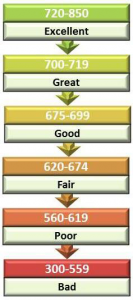When a lender is confronted with a borrower seeking financing they are looking for the 4 Cs of borrowing. In a post entitled “What is the Greatest Obstacle to Borrowing Money to Purchase a House?” I explained what the 4 Cs of borrowing are. In this post I intend to get much more specific as to what a lender is looking for in the category of Credit.
 When considering a borrower’s Credit, lenders are looking primarily at the borrower’s credit scores. In a post entitled “What is a Credit Score?” I explained that each borrower will have up to 3 credit scores; one credit score issued by each of the three national credit repositories, Experian, TransUnion, and Equifax. Lenders will use the middle of the 3 credit scores. For example, if a borrower has credit scores of 684, 702, and 691, the lender will recognize 691 as the borrower’s credit score. If there is more than one borrower, (i.e., husband and wife) the lender will consider the middle credit score for each borrower, but the lower of the middle credit scores will be the basis for any credit decision. Some loan programs have a minimum credit score requirement to be eligible for financing and they can vary by loan program and lender.
When considering a borrower’s Credit, lenders are looking primarily at the borrower’s credit scores. In a post entitled “What is a Credit Score?” I explained that each borrower will have up to 3 credit scores; one credit score issued by each of the three national credit repositories, Experian, TransUnion, and Equifax. Lenders will use the middle of the 3 credit scores. For example, if a borrower has credit scores of 684, 702, and 691, the lender will recognize 691 as the borrower’s credit score. If there is more than one borrower, (i.e., husband and wife) the lender will consider the middle credit score for each borrower, but the lower of the middle credit scores will be the basis for any credit decision. Some loan programs have a minimum credit score requirement to be eligible for financing and they can vary by loan program and lender.
Lenders also consider a borrower’s credit history over the most recent 24 month period of time. As a general rule, a borrower should have established at least a 2-year credit history and a have minimum of 2 open credit accounts in order to be considered for a mortgage loan. The lender is looking closely to see if a borrower has a history of paying his credit obligations in a timely manner. They tend to frown on accounts paid 30, 60, or 90+ days beyond their respective due dates.
Key Understanding: Payments received by a creditor past the payment due date, but within 30 days of the due date, will not affect your credit history or credit score, however, the creditor will likely assess a late charge.
 The lender will also take into consideration any public records, such as collection accounts, charge-offs, judgments, tax liens, a spousal or child support lien, loan modifications, bankruptcies, short sales, and foreclosures. Generally speaking, collection accounts, charge-offs, judgments, and liens will have to be satisfactorily resolved before a borrower will be permitted to complete the purchase. The existence of loan modification, bankruptcy, short sale, or foreclosure does not prevent a borrower from being able to purchase a home. However, occurrences of this nature have waiting periods associated with them that determine when a borrower will be eligible for a mortgage loan and have few exceptions.
The lender will also take into consideration any public records, such as collection accounts, charge-offs, judgments, tax liens, a spousal or child support lien, loan modifications, bankruptcies, short sales, and foreclosures. Generally speaking, collection accounts, charge-offs, judgments, and liens will have to be satisfactorily resolved before a borrower will be permitted to complete the purchase. The existence of loan modification, bankruptcy, short sale, or foreclosure does not prevent a borrower from being able to purchase a home. However, occurrences of this nature have waiting periods associated with them that determine when a borrower will be eligible for a mortgage loan and have few exceptions.
The lender will also look for any accounts listed as currently in dispute. If an account is in dispute, the dispute will have to be resolved before a borrower will be permitted to complete the purchase.
The lender will also look for inquiries into a borrower’s credit history by other creditors to determine if any new credit accounts not listed on the credit report have been opened and will factor any corresponding monthly payments in the borrower’s debt-to-income ratios.
There are exceptions that exist for a variety of credit related issues. Those exceptions are too numerous to cover at this time and beyond the scope of this post. If you have questions, we encourage you to contact us to schedule a time to talk about your specific circumstances.
If you’re interested in learning more about what it takes to purchase a home of your own, you’ll want to read other posts in the series, such as So, You Want to Buy a House?, The Power of Pre-Approval vs Prequalification, What is the Greatest Obstacle to Borrowing Money to Purchase a House?, What Are Lenders Looking For? Character!, What Are Lenders Looking For? Capacity!, What Are Lenders Looking For? Collateral!, What Are Lenders Looking For? Credit!, The Two Approvals, and more.
If you are interested in learning more about credit and credit scoring download our FREE report entitled “Credit Scoring and Wealth – The Game of Credit.”
Leave a Comment